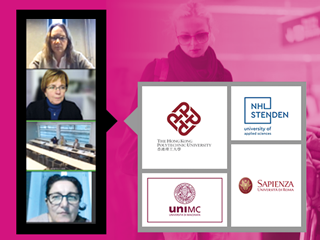
-
 publication: 6 December 2022
publication: 6 December 2022
On Tuesday November 29 the Project Younger Generations’ Digital Life And Sustainable Consumption of the department of Communication and Phycology of Aalborg University (Denmark) organized a webinar on Greentravel: Young Adults and the Drivers and Barriers of Sustainable Tourism Consumption.
Simona Staffieri and Elena Cavagnaro, from the Research Group Sustainability in Hospitality and Tourism of NHL Stenden Hotel management School, were invited to present their long-standing research on Youth Tourism and Sustainable Choices. In this brief report we wish to share some of the highly relevant reflections shared during the webinar.
The morning started with a presentation of a master student of Aalborg university, Nanna Bruunstrøm Jensen, reporting on two qualitative studies about youngster travel behavior, and particularly how they do reason and justify their choices for transportation. Most respondents were aware of the negative environmental impact of flying to a destination yet justified this choice with a variation of arguments from rational ones (flying as the cheapest and fastest option) to habits (not used to travel by train) to the image of well experienced travelers that they wished to expose on their social media. Both studies restituted a quite bleak image of young travelers. As the title of the presentation stated: “they do it time after time and still do not give a f***”.
The second speaker, Oana Heimdal Grigoras, is a graduate form the university. She presented a travel app she prototyped during her studies to get travelers navigate Copenhagen in a more environmentally friendly and socially responsible way. It was very interesting to listen to her reflections on ethical data use and the effort to develop a sustainable business model from which all benefit.
Simona and I got a full hour for our presentation and discussion. We presented the overall conclusions of the studies we conducted on youth tourism and sustainability in between 2012 and 2018. Our work received particular interest for the theoretical framework that we developed for our study and the international character of our research.
The last presentation, by Maria Wolrath Söderberg, focused on how people negotiate with other and themselves their travel choices. By listening to people’s arguments for their choices she tries to understand why a high awareness of the environmental consequences of the own behavior leads (or not) to a behavioral change. She shared two studies, one that targeted climate engaged people and the other targeted toward people who stopped flying in Sweden.
To the group of climate engaged people she asked whether it happened to them to do things that damage the climate even if they know that they should not. In 48 hours, 500 responses were gathered via an online survey distributed to the members of climate action groups. Situations mentioned by the respondents where flying first; then food; and third other forms of transportation. Respondents were aware of the consequences of their non-sustainable behavior and all of them had a justification for it.
Analysis of these justifications shew that there was a limited variation in arguments. The most frequent argument given as a justification of a non-sustainable choice was a kind of bank account with the natural environment with withdraws and deposits – I am eating vegetarian (a deposit), thus I van take a flight to a long distance destination (withdraw). Yet, people seemed not to use the right currency for this account – they were not aware of how much carbon they saved by their food choices compared with the travel that they undertook. The second most common reasoning was a comparation with friends and neighbors, people whose behavior is considered worser for the environment that the one of the respondents. People failed to see the amount of their own emission compared to others or compare themselves with big entities - such as China – and argue that their emissions do not matter compared to such big emitters. Clearly, ascription of responsibility was lacking, and respondents have also not a clear view of the amount of their personal emission compared, for example, of an individual inhabitant of China.
The second study, targeting people who stopped flying, was also very successful harvesting 1000 responses in few hours. Respondents were aware of the size of their individual environmental impact – thus knowledge matters! Yet the study also showed that not all knowledge matters. Knowledge about your impact, for example that your personal lifestyle uses the equivalent of three planets, does matter. Also, understanding the relation between personal choices and world justice issues does matter. What was also clear in the answers was their high positive moral content. People, for example, were not referring to ‘shame’ as the reason while they were not flying but to the positive impact that they could make with their choices. For the respondents, sacrificing flying was a conscious choice that costed pain and effort but in the end was positively and proudly embraced. Particularly, respondents who could share their struggle with a supportive environment were able to change rather easily. Also interesting was to see that people shared three main motives for changing their flying behavior: fear for climate change, lived experiences (such as witnessing increased wildfires and polluted shores), and care for their or other people’s children.
These findings resonate strongly with my research on enhancing sustainable behavior and, particularly considering the role of knowledge and of a supportive environment, are highly relevant for all of us who are working in high education.
Elena Cavagnaro and Simona Staffieri




 Back to overview
Back to overview

